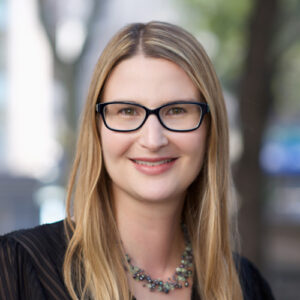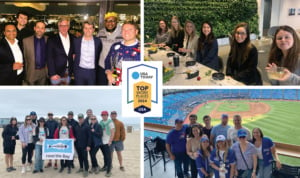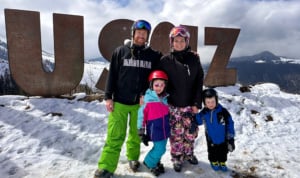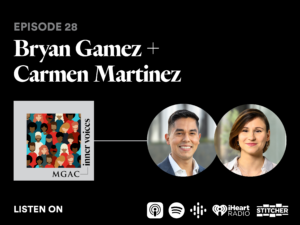Looking Beyond Pride 2023
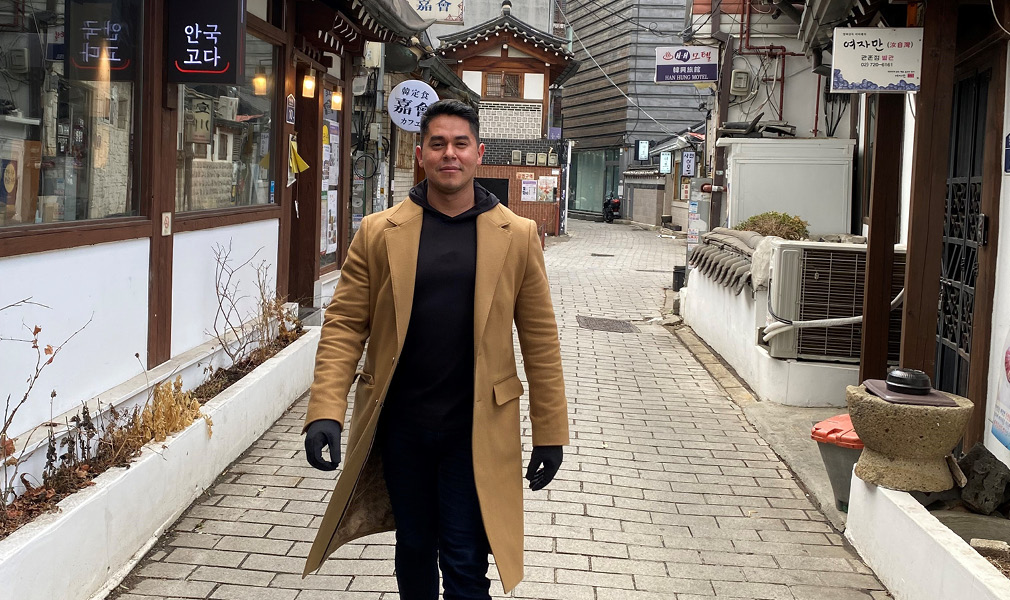
As U.S. Pride Month draws to a close, two MGAC employees, members of the LGBTQIA+ community share their perspectives. Bryan Gamez sat down with Sandra Kinahan to share his experiences in the construction industry, what he loves about what he does, and his hopes for the industry’s future. Bryan is a Project Manager in our Los Angeles office, co-chair of MGAC’s Diversity, Equity, and Inclusion (DEI) Committee, and host of our DEI podcast, MGAC Inner Voices. Sandra, our interviewer, is a Senior Communications Coordinator based in Glasgow.
While MGAC recognizes that this post is not fully inclusive in its representation of the LGBTQIA+ community, we hope it provides some insight and inspiration as we work to build an increasingly diverse company and industry.
Sandra Kinahan (SK): Hi Bryan! Thank you for joining me to talk about your experiences as a gay man in the architecture, engineering, and construction (A/E/C) industry this Pride month. I’d love to start by learning more about what you do at MGAC?
Bryan Gamez (BG): Day-to-day, as a Project Manager, I am responsible for supervising projects from permitting through the design process, construction, and close-out in media (entertainment studios), hospitality, and healthcare sectors.
SK: What do you love about your work?
BG: I love how tangible it is. I love having that rewarding feeling of stepping back from a building or a space at the end of construction and seeing it, like “wow, we built this.” I love being part of a team and seeing the designers’ and clients’ visions come to life. It is a very special moment that is so fleeting at the very end of every project.
I’ve always loved architecture and construction, and I’m a tactile person, I love being able to touch my work. At MGAC, it’s also been the team members, and having my little dog that comes with me to the office.
SK: Aww! So, why do you think it’s important to talk about Pride in a professional context?
BG: I think it’s important to always promote visibility for queer people in this space, because unlike other fields in the country—maybe marketing or social media, where there’s a lot of queer people—there isn’t that same visibility and representation in the A/E/C industry.
I hope this can encourage others to join the A/E/C industry because I think there is probably a stigma that it’s not accepting. It can be tough to feel accepted or visible in this industry, but I think when you meet people like me who are unapologetically and authentically themselves, there’s no reason to ever feel like you won’t be accepted.
I also want to highlight here at the very beginning of this conversation that I’m very thankful to MGAC for allowing me to have a platform (MGAC Inner Voices) and a safe space within the company as a gay Latino man.
SK: When it comes to everyday workplace culture, what has been your experience in the industry?
BG: I came from a general contractor, and I was always surrounded by amazing female project managers. God bless them because they always made me feel protected, and to a certain degree, I don’t think I ever needed to have that sense of protection but… they always had that mentality to look out for me, and I always appreciated it.
At MGAC, there’s been an environment that’s allowed me to flourish and not doubt myself, because my co-workers here have always been so accepting, and being queer hasn’t been a topic that needs to come up. I feel empowered here. I feel encouraged. I feel supported. I feel the positivity.
It starts with senior leadership, who have been so supportive. The DEI Committee Co-Chairs, Beth Scully and Dara Jafari and I, are trying to create new initiatives to ensure MGAC is a powerhouse in the DEI world. During the pandemic, we introduced the concept of adding pronouns to our email signatures. While it’s very surface level, it provides visibility and representation to our LGBTQ+ community. They are our friends, they are family members, and they are our co-workers.
I did have an experience where I felt like I had to go back into the closet at one company.
There, I had gay co-workers, but we avoided talking about “gay” topics. I just thought to myself, “Why can my straight co-workers talk about their health, but I can’t?” It felt like this company did not promote culture and diversity. If they did, maybe I would have stayed. But, it’s my life, right? I take responsibility for who I want to be and what I want to be associated with.
SK: Absolutely. So, how can an individual employee help make their workplace more welcoming?
BG: As allies, straight allies in this instance, it’s always good to just not jump to conclusions, right? I always want to encourage people not to generalize and assume things based on one stereotype. Don’t force someone to speak about their personal life. It’s more about trying to be a good listener, an open listener; have an open mind and an open heart.
SK: Letting people come to you and taking the lead from those individuals is important. Everyone has their own personal / professional boundaries.
BG: 100%, I think that’s spot on.
SK: There are many quantifiable actions a company can take. But so much also comes down to culture, and questions like, “Do I feel that my co-workers can respect me on a personal level? Is there underlying negativity that might affect my ability to do my best work?”
BG: I’ve actually been reading the book by Dr. Alan Downs, The Velvet Rage: Overcoming the Pain of Growing up Gay in a Straight Man’s World. It is specifically noted for gay men, but it hits on these three stages of a gay man’s life. The first stage is ‘Overwhelmed by Shame,’ the second is ‘Compensating for Shame,’ and the third is ‘Cultivating Authenticity.’ I can relate to that.
When I started off, I had anxiety that I needed to conform, to be part of this homogeneous pool. But as I’ve grown up, I’ve removed that shame of who I am or who I think society wants me to be. I really embraced my queerness and my differences which has helped me become a more confident person.
I want people to know that it’s a process, but there are others that will support you on your journey. You’re never going to be alone. You can always reach out to people like me for information or look at resource groups to understand your opportunities.
SK: Absolutely. I feel like this sense of identifying with strength and independence can become so important to individuals who have experienced adversity. It’s a shame that, on the flip side, this could occasionally hold us back from reaching out to other people. Being part of a community can teach us so much about ourselves. It can help you see that you don’t have to give away your power to people who want you to affirm their worldview.
BG: I think that’s a really good point. When I was younger, especially, I would give power, unconsciously, to the people around me. I would push aside my personality to make others more comfortable.
SK: That sounds exhausting.
BG: Yes, it is exhausting because at that point, you’re not being your best self. You’re not being efficient in your career, at the processes, and this is a very fast-paced environment. I want people to know that no matter who you are or how you identify, you should always 100% put yourself first. Your mental, physical, and emotional health is number one. You are going to be most successful when you put yourself first.
I know where my values stand and I’m not going to give power to people that try to suppress or oppress me.
SK: That’s great to hear. Of course, there are situations in which it’s important to protect yourself, and every individual can judge what they want to share with other people. I can see how, while it may sometimes be easier to hide away, it may not be the best thing for you in the long run. If you are lucky enough to be in a place where you can really own who you are, you show people that they’ll have to climb a higher hill if they want to try to bring you down.
BG: Absolutely. I think those are skills that lead you to living an authentic life. This book I’m reading highlights those skills. There will be times where you will feel uncomfortable, and the easiest thing is to try and hide. I’ve done a disservice to myself by hiding in the past.
SK: Like ‘surviving’ rather than ‘living.’
BG: Right. I see a future where the queer community can stop living in survival mode. That’s kind of what we’re used to doing, and I think current bills and legislation are making a lot of folks in our community feel like they need to be in survival mode. There’s legislation being pushed to remove DEI efforts, but that’s only going to fuel more activism.
We are a powerful group of people. My sexuality hasn’t changed any of the opportunities I’ve had in my career, but I hope that by being visible we can create those opportunities for even more queer folks. I am a cisgender gay man, but to all my fellow queer members, you’re visible, you matter, and you are loved.

Bryan has been reading The Velvet Rage: Overcoming the Pain of Growing up Gay in a Straight Man’s World by Dr. Alan Downs.
